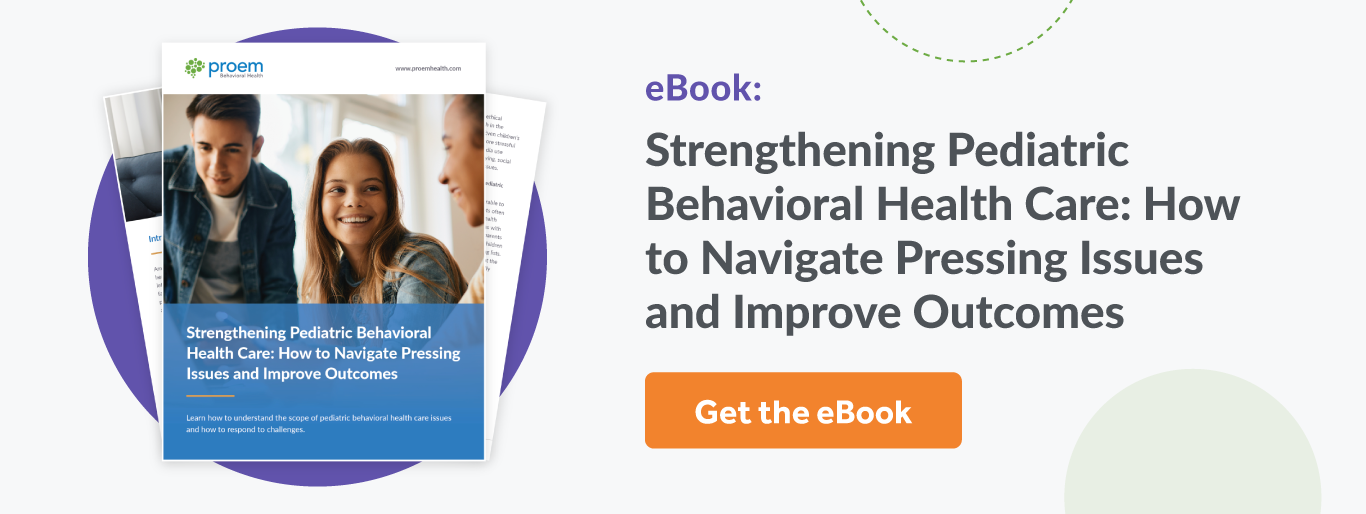
Increasing numbers of children and adolescents are suffering from mental health issues, made even worse by the long-term effects of isolation during COVID-19. The statistics are alarming: approximately 20% (one in five) children aged three to 17 have a diagnosable mental, emotional, developmental or behavioral disorder. Over 30% of children with a mental health condition have more than one diagnosis.
At the same time, there is a nationwide shortage of therapists for children and teens. Only 51% of children and adolescents aged six to 17 who have mental health conditions receive treatment in any given year.
In ECRI's "Top 10 Patient Safety Concerns 2023" report, the non-profit safety organization ranked the pediatric mental health crisis its #1 concern.
How Pediatric Assessment Tools Can Help
One solution for improving mental health care for kids is to screen all children and adolescents for mental health issues to help prevent children from falling through the cracks. To make this work, the initial screening must be accurate, quick, easy to administer and economical. Some commonly used pediatric screeners include:
-
Pediatric Symptom Checklist, which has 17 questions and is used for children and adolescents from four to 17 years old. This is a general (primary) screening tool. Secondary screeners are necessary to provide more detailed assessments of specific sets of symptoms.
-
M.I.N.I. KID 7.0.2 is a child and adolescent assessment tool in the form of a structured interview. It assesses the most common diagnosed pediatric mental health conditions and takes approximately 15 minutes to administer.
-
CYBOCS is the Children’s Yale-Brown Obsessive Compulsive Scale and is a structured interview used to assess OCD in children.
In a "Pediatric Mental Health Minute Series," the American Academy of Pediatrics, posits that, “The use of standardized screening tools by pediatric providers is more effective in the identification of developmental, behavioral and psychosocial issues in children than clinical assessments alone.”
Undiagnosed or untreated pediatric mental health disorders not only have a direct impact on the child and their family but can also radiate out to affect the larger community. In addition, untreated childhood disorders are unlikely to resolve on their own. Instead, the disorders usually continue to cast shadows over the rest of the child’s life.
The more mental health disorders in children and teens can be identified early, the better the chances they can be treated before they cause lifelong problems.
Pediatric Assessment Tools: More Accurate Than Clinical Judgment
According to the Pediatric Mental Health Institute of Children’s Hospital Colorado, using a high-quality children’s mental health assessment tool, such as those accessible in the Proem Behavioral Health platform, enables pediatricians and other healthcare providers to identify far more patients who are at risk.
Its report notes, “Unfortunately, pediatric practices often under-detect mental health issues in children, particularly when medical providers rely on clinical judgment or poorly constructed screening measures ... Pediatric providers who rely solely on clinical judgment to identify patients with mental health concerns will only positively identify approximately 30% of clinical patients, whereas 70% of these patients are accurately identified when using a validated screening measure.”
With more than twice as many patients having their mental health issues accurately identified when pediatric assessment tools are used, this makes a very clear case for their increased use.
The Importance of Routine Screening with Child and Adolescent Assessment Tools
Since pediatric assessment tools help identify so many more children with mental health issues than physician judgment alone, it’s important that everyone be screened using such tools. That’s why it’s essential to incorporate primary screening tools into routine pediatric visits.
The U.S. Surgeon General’s advisory report, “Protecting Youth Mental Health,” also recommends that children be routinely screened for “mental health challenges and risk factors, including adverse childhood experiences.” These screenings can be conducted by:
-
primary care providers during well-visit appointments, annual physicals or office visits for routine vaccinations;
-
schools;
-
hospital emergency departments;
-
and other healthcare providers and organizations.
Furthermore, in 2022, the U.S. Preventive Services Task Force (USPSTF) issued new behavioral health-related recommendations for primary care physicians. The task force reaffirmed its previous recommendation that adolescents aged 12 to 18 years should be screened for depression and added a separate recommendation that children and adolescents aged 8 to 18 years should be screened for anxiety.
What Is Included in a Full Assessment on a Pediatric Client?
As important as a pediatric assessment tool is, its usage is only the first step in helping put children and adolescents on a path to recovery from a mental illness. Providers should seek information about the child from multiple sources. The “Clinical Practice Guidelines for Assessment of Children and Adolescents,” published in the Indian Journal of Psychiatry, addresses the question of what is included in a full assessment on a pediatric client, emphasizing the importance of gathering information from a broad range of sources.
Pediatricians should always talk with patients and/or the patients’ families to discuss any findings that come up on the primary pediatric assessment tool. These discussions should cover:
-
how severe the child’s symptoms are and how long the symptoms have been occurring;
-
whether the child is impaired at home, in school or with their peers; and
-
if there are any stressors in the family.
It’s also crucial to get input from the child’s school.
There are several difficulties involved in conducting a children’s mental health assessment. Children may not think the assessment is necessary and may only be there because their parents brought them. They may be unable to accurately report the frequency of their symptoms, and they may feel too embarrassed to reveal problems they’ve been experiencing.
It's essential for pediatricians to work to overcome these and other obstacles they may encounter in their efforts to judiciously perform pediatric assessments. Research indicates that physicians must “be astute and conscientious in obtaining information from multiple sources and settings, i.e., the child, parents, teachers, and other caregivers. There are bound to be discrepancies in the report; nevertheless, multi-source information is a requirement during diagnosis and management.”
Proem Makes Pediatric Screening Simple and Efficient
Pediatricians and other healthcare providers need pediatric assessment tools that are validated and easy to use. Proem offers evidence-based, clinically validated assessment tools for children and adolescents aged six through 17.
These child and adolescent assessment tools are easy to administer, making it practical to incorporate them into routine healthcare visits for all patients. The tools assess a wide variety of conditions, going beyond depression and anxiety. Proem also provides tools that measure functional impairment, outcomes and severity, giving clinicians the information needed to adjust therapies when necessary and access critical data.
Schedule a time to see firsthand how our platform supports providers in their efforts to deliver outstanding pediatric behavioral health services.





.png)








